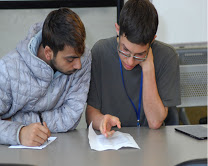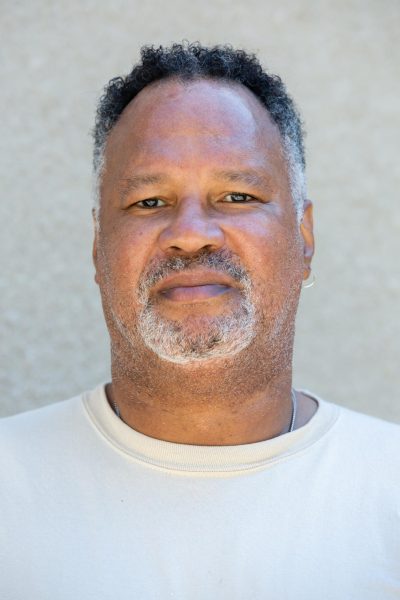Home schooling pays off

English major Ellis Ryan Mille tutors a student in the Library Learning and Resource Center.
Apr 10, 2018
A small community of home-schooled students have used their independent learning skills and creativity to transition, thrive and lead at Contra Costa College.
This group of home-schoolers have supported each other in making the transition to college and they each defy the perceptions about homeschooling in their own unique way.
Ellis Ryan Miller is 15 years old and plans to transfer to the UC system as a junior after two more semesters at CCC. He is studying Japanese and wants to be a linguist teaching English in Japan.
Miller’s brother Alton Miller was also home-schooled, and he began taking classes at CCC more than a year ago when he was 12 years old. Alton wants to pursue a STEM major.
Emma Mink is 16 years old and began her studies at CCC when she was 12. She now has two associate degrees and a certificate in STEM. She is working on completing some of her medical school prerequisites at CCC because, she said, “I figured it would be cheaper.”
Owen Mink is Emma’s twin brother and he is taking classes at CCC that will count toward his high school diploma that he plans to complete in one more year.
“I will have most of my college- level general education out of the way by the time I finish high school and I will be able to focus on my major,” he said.
But Owen Mink is on a different track as he is using the extra time he gained from home schooling to train to be a ballet dancer.
All the students began studying at CCC in a program, known as concurrent enrollment, in which home-school students can complete parts of their high school education at community college.
The two families took advantage of online resources and support for home-schooling parents from Valley View Charter Prep.
Christina Miller, the mother of Ellis and Alton, said she didn’t use much of the standard curriculum.
“They (Ellis and Alton) learned very easily when they were young. We went to the library and I answered their questions and we read book. We also did a lot of math workbooks and when they got into more complicated literature there were online classes as well as other creative classes for them to take,” she said.
“They were able to do about 50 to 75 percent of the education on their own. I would make sure that they covered some areas that they didn’t pick to learn themselves.”
Ellis Miller said the agreement was that the students would do two hours of “school work” each day and use the rest of the day to study our own interests.
“Home schooling definitely has to be the right fit,” Emma said. “I would recommend home schooling because it can help you get a jump on your education, but you really need a supportive parent.”
“My mom stayed at home to teach us. It’s kind of a ‘must.’ I credit my mom with where I am today because she helped me plan out my educational path,” she said. “I can plan my own work now, but I really needed her help early on.”
Each family had unique reasons for getting started with the home schooling route.
“My husband was doing postdoctoral research (so) we did not have money for preschool. I began teaching Ellis at home. He was interested in learning. It was just clear,” Christina Miller said.
“Later, we put him in kindergarten and tested it out to see what was better. Ellis liked the freedom better and it seemed like he was learning more at home.”
Ellis said it eliminated the transportation time of getting to a school. And then with a smile he said, “I’m also an introvert. On the Myers Briggs personality test I always score INTJ. I’m just comfortable being alone.”
The Minks started home schooling after the twins had opposite problems in kindergarten and first grade.
“I was struggling with the pace, but my sister was bored with the pace,” said Owen.
For Owen Minks home schooling has allowed him to follow his passion and manage a mild learning disability. He said he feels that although he needed the home schooling format to keep pace with other students, now the combination of college classes and memorizing complex (ballet) choreography is helping him to transform his learning process.
“The choreography is really fast-paced, and you have to think about the coordination of each move, kind of like listening to a teacher and taking notes,” he said.
That first class at college was little daunting for all the home-schoolers, but they each said the community at CCC has really been supportive. After catching up on skills for exams and note taking during lectures, their adjustment to institutional learning has been mostly smooth.
“My second semester the teacher was intent on working in groups,” Ellis Miller said. “We would do random groups by counting off one through five. At first, I didn’t really do much. Then I eventually started giving little insights. I still do not like group work that much, but I’m not completely stressed out about it like I was back then.”
He works in the Learning Resource Center at CCC where he tutors students in English, Japanese and math.
“I have tutored people who are 60 years old. Sometimes people say, ‘This tutor is so young he could be my son’,” Ellis said.
Alton Miller said, “It has been stressful at times but I have been able to get through it. Of course finals are always awful.”
Emma Mink takes part in the Associated Students’ Union and she says that they have been like a second family to her.
“People always have a lot of questions about how you socialize. My answer is ‘just like everyone else.’ This campus is a good fit for me because I talk with a lot of people,” she said.
English department Chairperson Joy Eichner-Lynch said, “The value of home schooling is its ability to foster curiosity, confidence and imagination.
“Students haven’t been taught that school is a place to trust yourself. Too many students are worried about right or wrong. That’s what I see in home-school students that is so delightful,” she said.
“As a professor you have to find ways to help students develop trust in themselves. When you take away that self-trust at an early age it can be difficult to regain it later on.”
Ellis Miller said, “If I were put in the same situation as my mother I think I would home-school my kids as well because that is what I enjoy; teaching, but maybe I would like to do it with less than three kids because that is a lot.”



rhonda riddle • Apr 12, 2018 at 10:33 am
Amazing parents, then amazing kids. The dedication of these parents is wonderful. I take my hat off to them.